La crise du Covid-19 est-elle le marqueur d’un effondrement imminent de notre civilisation ? La crise liée à la pandémie a fait souffler un vent de collapsologie qui aurait convaincu de nouveaux adeptes. Et si le récit de l’effondrement futur de nos civilisations était le nouvel avatar du pessimisme français ? « Certains pensent que la civilisation telle que nous la connaissons va s’effondrer dans les années à venir » : en s’appuyant sur cette thématique, une étude internationale Ifop menée en France, au Royaume-uni, en Allemagne, en Italie et aux Etats-Unis, par Jean-Laurent Cassely et Jérôme Fourquet, pour la Fondation Jean Jaurès, montre pourquoi et comment la collapsologie rencontre un écho important en France et dévoile le profil et les affinités politiques de ses adeptes.
La France est le deuxième pays qui croit le plus en une prophétie collapsologique, derrière l’Italie (71 %) mais devant le Royaume-Uni (56 %) et les États-Unis (52 %), selon les données d’une étude de la Fondation Jean Jaurès. Popularisée notamment par l’ouvrage de l’Américain Jared Diamond, Collapse : How Societies Choose to Fail or Succeed (2005) (“Effondrement : comment les sociétés décident de leur disparition ou de leur survie”), cette théorie « repose sur l’hypothèse selon laquelle le changement climatique, la diminution des ressources et l’extinction des espèces conduisent le monde à sa destruction à un rythme alarmant ».
Œuvres publiées, films et séries sur le sujet font souvent jouer au changement climatique et à l’épuisement des ressources naturelles un rôle central dans le collapsus. Et l’érosion de la biodiversité, la prolifération nucléaire, le réchauffement climatique de plus en plus prégnant font penser à une fuite en avant que dénonce notamment le chercheur Luc Semal dans son ouvrage « Face à l’effondrement – Militer à l’ombre des catastrophes ».
Quand on interroge les personnes jugeant probable une telle issue, le scénario climatique et écologique est de fait souvent invoqué mais avec une intensité variable selon les pays.
Le récit effondriste : nouvel avatar du pessimisme français
Selon cette étude internationale sortie en novembre 2019, si la prophétie collapsologique a gagné beaucoup de terrain dans les imaginaires occidentaux ces dernières années, c’est en France et en Italie qu’elle rencontre manifestement le plus d’écho. 71 % des Italiens et 65 % des Français sont d’accord avec l’assertion selon laquelle « la civilisation telle que nous la connaissons actuellement va s’effondrer dans les années à venir ». Cette vision apocalyptique n’est partagée « que » par 56 % des Britanniques et par 52 % des Américains. Enfin, en Allemagne, cette thèse fait beaucoup moins recette avec un score de 39 %.
Deux remarques peuvent être faites à ce stade. La première est que le libellé de la question est très général et ne focalise pas spécifiquement sur les causes climatiques ou écologiques d’un tel effondrement. Cette précision a son importance car l’acception environnementale de la collapsologie est, comme nous le verrons plus loin, plus présente dans des pays comme la Grande-Bretagne (où est apparu par exemple le mouvement Extinction Rebellion) ou l’Allemagne. Le fait que les causes de l’effondrement ne soient pas, à ce stade du déroulement du questionnaire, précisées permet donc de capter un ensemble de représentations et de perceptions déclinistes.
Par ailleurs, le terme de « collapsologie », encore méconnu d’une partie de l’opinion et potentiellement clivant, n’était pas employé dans le libellé de la question pour laquelle seule une thèmatique était introduite en indiquant que « certains pensent que la civilisation telle que nous la connaissons va s’effondrer dans les années à venir », demandant ensuite aux enquêtés leur degré d’accord ou de désaccord avec ce diagnostic.
La seconde remarque découle de ce constat. On peut faire l’hypothèse que le degré d’adhésion à la thèse d’un effondrement prévisible de la civilisation constitue un bon indicateur de la prégnance du déclinisme et du pessimisme dans une société donnée. À l’appui de cette hypothèse, on notera que c’est en Allemagne, pays jouissant d’une très solide assise économique et institutionnelle, que le pronostic de l’effondrement de la civilisation est le moins répandu, suivi par les deux pays anglo-saxons puis enfin par la France et l’Italie, nations aux performances économiques moins satisfaisantes et où les tensions sociales et politiques sont fortes.
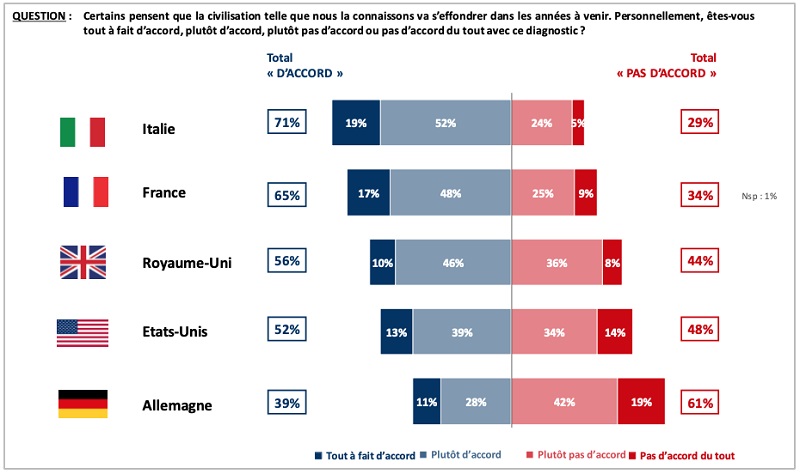
L’adhésion à la théorie d’un effondrement de la civilisation
65 % des Français d’accord avec la théorie de l’effondrement
Autre spécificité française, alors que l’adhésion à une vision collapsologique est dans les différents pays plus répandue dans les jeunes générations, quand les seniors y semblent plus réfractaires, ce clivage générationnel ne fonctionne pas en France. Dans notre pays, toutes les générations, soixante-cinq ans et plus compris, partagent le même sombre diagnostic.
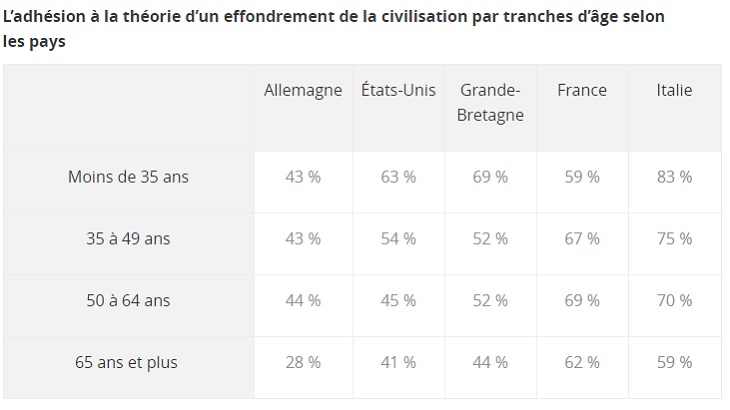
Si le sondage dégage une moyenne de 65 % de Français d’accord avec la théorie de l’effondrement, la proportion de ceux qui pensent que la civilisation va s’effondrer progresse à mesure que le niveau de vie diminue : 50 % des membres des catégories aisées adhèrent à la théorie, 61 % parmi les membres des classes moyennes supérieures, 64 % parmi ceux des classes moyennes inférieures, et le pourcentage culmine à 75 % parmi les catégories modestes, avant de légèrement redescendre chez les Français les plus pauvres de notre typologie en cinq tranches de revenus (64 % adhérent à cette thèse).
Sur le plan éducatif, c’est parmi les sans diplôme (73 %) que l’adhésion est la plus forte. Nous verrons plus loin comment ces chiffres varient fortement en fonction des appartenances politiques mais, pour l’heure, il est important de noter que le portrait statistique qui se dégage de ces résultats issus d’un échantillon représentatif ne coïncide guère avec les enquêtes réalisées jusqu’alors auprès des milieux « collapsonautes », terme employé à propos d’individus qui sont non seulement convaincus de la menace, mais ont entamé une réorientation de leurs modes de vie pour mieux s’y préparer (ils se distinguent des « collapsosophes », plus portés sur le changement intérieur et spirituel, et des « collapsologues » à proprement parler, qui sont les théoriciens et les inventeurs de la collapsologie).
Dans la revue Yggdrasil cofondée par Pablo Servigne, une étude menée par trois enseignants membres de l’Obveco, l’Observatoire des vécus du collapse, auprès de participants à des forums Facebook collapso, aboutit au portrait suivant : des hommes (60 %), urbains (65 %), « très diplômés par rapport à la population française et plutôt jeunes (entre trente-quatre et trente-huit ans de moyenne d’âge selon les études) », puisque « 85 % des collapsonautes ont suivi des études supérieures, voire très longues » et qu’« ils manipulent bien l’information scientifique et savent exercer leur esprit critique. » Ce collapso engagé est un « geek », écrivent encore les auteurs, « car ses connaissances sont très pointues pour un non-spécialiste ».
Il y a un décalage entre le portrait-robot d’un collapsonaute (sur-)diplômé, (hyper-)informé et volontariste d’une part, et le niveau socioculturel des adhérents à la thèse de l’effondrement dans ce sondage qui peut s’expliquer de la manière suivante. Les collapsonautes engagés, qui fréquentent les plateformes et les lieux de débat et ont même engagé une transition, représentent une minorité éclairée très exposée médiatiquement, scrutée par les journalistes et les chercheurs. L’enquête montre un mouvement plus souterrain et massif d’adhésion à la thèse de l’effondrement de la part d’une population qui vit ce risque sous l’angle d’une menace et qu’elle associe à une situation sociale et économique globalement « dominée », ou subie sans grande marge de manœuvre pour s’en extraire. Son adhésion signale l’impuissance plutôt que le volontarisme collapsonaute et ses accents scoutistes, qui sont le propre de cette minorité de décrocheurs ou décroissants volontaires. Il est par ailleurs peu probable que ce public économiquement fragilisé se définisse comme sympathisant de la « collapsologie », un terme qui n’a pas utilisé dans les questions du sondage.
Echéance de l’effondrement : demain !
Autre symptôme de ce rapport particulièrement inquiet à l’avenir en France, parmi les personnes adhérant à l’idée d’un effondrement, la proportion de ceux qui anticipent cette échéance d’ici dix ou vingt ans (c’est-à-dire demain si on se place à l’échelle temporelle d’une civilisation) est particulièrement élevée : 54 % contre 41 % en Italie et 32 % en Grande-Bretagne par exemple.
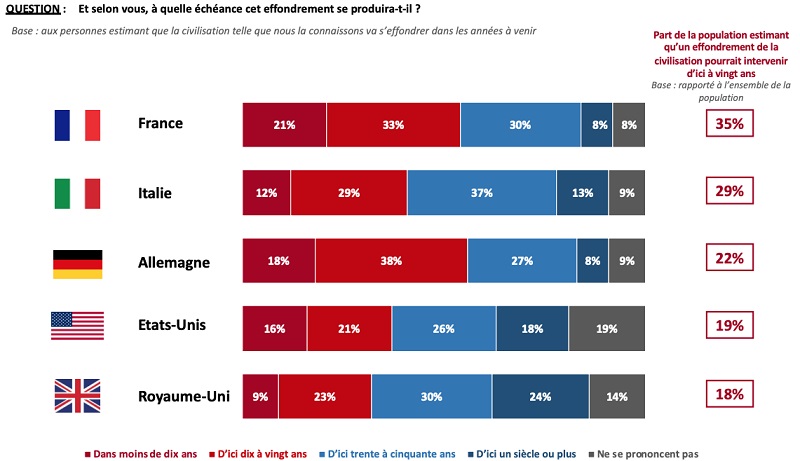
Ramenée à l’ensemble de la population de chacun des pays, la proportion de personnes partageant la thèse d’un effondrement à venir et le diagnostiquant au maximum à une échéance de vingt ans s’établit à pas moins de 35 % de la population en France contre 29 % en Italie, 22 % en Allemagne et moins de 20 % aux États-Unis (19 %) et en Grande-Bretagne (18 %).
Un tiers de nos concitoyens anticipe ou juge très probable l’effondrement de notre modèle de société d’ici à vingt ans.Un tiers de nos concitoyens, soit une proportion élevée, anticipe ou juge très probable l’effondrement de notre modèle de société d’ici à vingt ans. Au regard de ce chiffre, on comprend mieux pourquoi les ouvrages et traités de collapsologie rencontrent un tel succès de librairie, qu’il s’agisse par exemple de Comment tout peut s’effondrer. Petit manuel de collapsologie à l’usage des générations présentes de Pablo Servigne et de Raphaël Stevens, du Plus grand défi de l’histoire de l’humanité. Face à la catastrophe écologique et sociale d’Aurélien Barrau ou de Devant l’effondrement. Essai de collapsologie d’Yves Cochet.Une montée en puissance caractérisée
Comme l’a analysé le chercheur Olivier Gadeau, la thématique de l’effondrement s’impose au milieu des années 2010 dans le débat médiatique français, avec la popularisation croissante du terme « collapsologie » à partir de 2015 et surtout de 2018 dans les médias – il s’agit d’années marquées par de nombreux bouleversements géopolitiques : crise humaine des réfugiés, crise politique européenne, crise écologique.
D’abord présentée avec un recul critique mêlé d’amusement pour cette théorie aux airs de science-fiction, la collapsologie va néanmoins s’imposer comme un récit crédible dans cette décennie anxiogène, et la question posée lors de nombreux débats paraît ne plus être la plausibilité de la thèse, mais son degré d’imminence ainsi que les solutions concrètes pour y survivre et s’y adapter – dans la mesure où, pour reprendre le titre d’un ouvrage du trio Pablo Servigne, Raphaël Stevens et Gauthier Chapelle publié en 2018, Une autre fin du monde est possible.
C’est certainement au cours de ces années charnières que l’hypothèse d’un effondrement va quitter le registre hollywoodien du film catastrophe (2012, Le Jour d’après, Deep Impact…) pour devenir l’arrière-plan de fictions de plus en plus réalistes.
Conséquence de la visibilité des penseurs, des analystes et des influenceurs de l’effondrement, une pop culture collapso s’est développée, avec comme récente illustration la mini-série produite par Canal Plus, L’Effondrement. La série fait le choix scénaristique d’un effondrement soudain mais réaliste et présente en huit épisodes, dont certains diffusés sur YouTube par la chaîne, plusieurs tableaux qui donnent un avant-goût des conflits auxquels la société française serait confrontée lors du grand collapse économique, social et politique du pays. Le premier épisode se déroule dans un supermarché en rupture de stock. On assiste dans le deuxième au rationnement de l’essence dans une station-service, etc.
Quels scénarios collapsologiques ?
Les adeptes de la thèse de l’effondrement divergent en fait quant aux causes identifiées. Deux grands narratifs se concurrencent et fédèrent à peu près le même nombre de suffrages.
Ceux qui pensent que la cause la plus probable serait « les conséquences du réchauffement climatique et de la surconsommation (disparition des espèces, catastrophes climatiques, épuisement des ressources) » sont à peu près aussi nombreux (27 % en France par exemple) que ceux (32 % dans notre pays) qui pensent plutôt « qu’il n’y aura pas d’effondrement soudain mais plutôt une dégradation progressive des conditions de vie actuelles ».
À côté de ces deux visions effondristes mainstream existent deux autres scénarios plus minoritaires et renvoyant à un autre imaginaire nettement plus violent. Sans doute sous l’effet de la crise migratoire de 2015-2017 et des images extrêmement fortes qu’elle a charriées, l’hypothèse d’un effondrement sous « l’effet de vagues migratoires totalement incontrôlables » recueille un score conséquent en Europe continentale (12 % en Italie, 15 % en France et 17 % en Allemagne) et s’y classe en troisième position. Ce scénario fait moins recette en Grande-Bretagne et aux États-Unis (7 %).
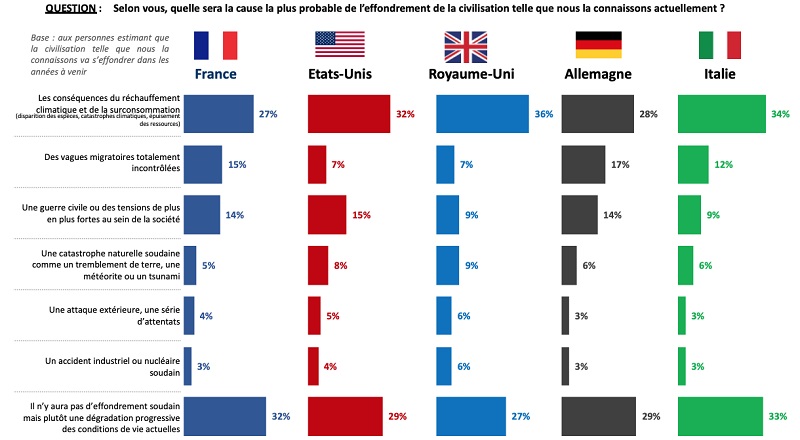
L’hypothèse d’un effondrement causé par « une guerre civile ou des tensions de plus en plus fortes au sein de la société » réunit également un nombre d’adeptes conséquent : 15 % aux États-Unis, 14 % en France et en Allemagne et 9 % en Italie et en Grande-Bretagne. Le questionnaire propose également d’autres options mais ayant trait à la survenue d’un fait accidentel ou d’un événement particulier.
Ces scénarios, qu’il s’agisse d’un accident industriel ou nucléaire, d’une vague d’attentats ou d’une catastrophe naturelle ne convainquent guère les personnes adhérant à un diagnostic collapsologique. Tout se passe comme si pour bien fonctionner le narratif effondriste devait s’appuyer sur un raisonnement de type systémique. Manifestement, ces individus créditent notre société d’une certaine forme de résilience qui la mettrait à l’abri d’une réaction en chaîne provoquée par un seul événement. Ils pensent en revanche que l’effondrement commencera sous la pression de phénomènes beaucoup plus massifs, soit sur le plan environnemental et climatique (tels ce que décrivent des films comme Home de Yann Arthus-Bertrand où La 11eHeure de Nadia Conners), soit d’une thrombose et d’une dégénérescence de notre société, soit enfin sous les coups de boutoirs de crises migratoire ou sociale majeures.
Survivalistes et collapsonautes : deux récits effondristes pour deux imaginaires politiques
Si toute une partie de la société française communie dans la projection d’un avenir funeste, les imaginaires qui se développent et sont mobilisés font réapparaître des lignes de clivages générationnelle et politique. Comme le montre le graphique suivant, plus on progresse dans la pyramide des âges et plus la propension à adhérer au scénario d’une décadence et d’une dislocation progressive est prégnante.
C’est dans les jeunes générations que la thèse d’un collapsus environnemental et climatique est la plus présente.Et, à l’inverse, c’est dans les jeunes générations que la thèse d’un collapsus environnemental et climatique est la plus présente. Au regard de ces chiffres, il apparaît que dans les générations les plus âgées, qui ont grandi pendant les Trente Glorieuses, l’impact de nos modes de vie et de consommation ne soit pas spontanément vu comme pouvant à terme provoquer un effondrement de notre civilisation. Elles adhèrent bien davantage à l’idée, nostalgique, d’une progressive décadence, la vision collapsologue dans cette génération s’articulant sans doute en partie autour du thème classique du « Tout fout le camp et c’était mieux avant ».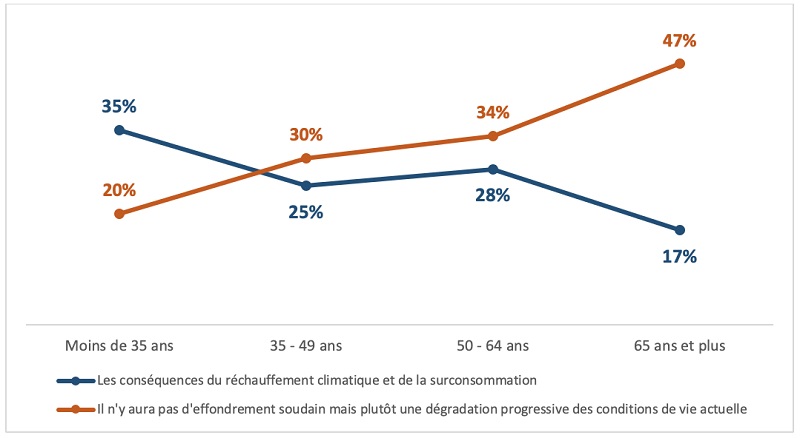
La cause la plus probable de l’effondrement de la civilisation par tranche d’âge en France
Les générations les plus jeunes adhèrent beaucoup moins à cette vision d’un délitement progressif et d’un déclin au long cours mais se montrent en revanche beaucoup plus sensibles à l’impact du changement climatique et de la surconsommation des ressources sur le thème « Il n’y a pas de planète B ». Cette différence d’approche générationnelle majeure qui s’observe également en Allemagne renvoie à une reconnaissance très variable selon les tranches d’âge de l’impact du way of life occidental sur l’équilibre de la planète.
Le récit effondriste fait preuve d’une grande diversité et plasticité pour coller aux cultures des différentes familles politiques.Parallèlement à ce clivage générationnel marqué, le récit effondriste fait preuve d’une grande diversité et plasticité pour coller aux cultures des différentes familles politiques. Ainsi, assez logiquement, la vision d’un épuisement des ressources et du dérèglement climatique s’impose très largement parmi les sympathisants écologistes (56 % de citations) et dans une moindre mesure, bien qu’étant également en tête, au sein des sympathisants des Insoumis (37 %) et du Parti socialiste (31 %). Les sympathisants macroniens qui pensent que l’effondrement est possible partagent plutôt un imaginaire de droite dans la mesure où l’option qu’ils privilégient pour 45 % d’entre eux est celle d’un déclin progressif.C’est sans doute pour conjurer cette perspective funeste d’un déclin français qu’ils ont fait leur l’ambition transformatrice et réformatrice d’Emmanuel Macron. On retrouve cet état d’esprit parmi les sympathisants Les Républicains (LR) qui citent à hauteur de 33 % ce scénario d’une décadence ou dégénérescence. Les soutiens du Rassemblement national (RN), quant à eux, sont les seuls à placer en tête parmi les causes d’un effondrement prévisible l’effet de vagues migratoires incontrôlables qu’ils sont 30 % à retenir (soit le double par rapport à la moyenne). Ils sont également nettement plus nombreux que la moyenne des Français collapsologistes à craindre « une guerre civile ou des tensions de plus en plus fortes au sein de la société » (21 % contre 14 % en moyenne).
Gageons que, pour cet électorat, ces tensions au sein de la société seraient en lien direct avec le phénomène migratoire et que l’imaginaire de guerre civile qu’ils partagent met aux prises différentes communautés ethno-culturelles.
La perspective effondriste est, dans les autres pays également, très fortement indexée sur les cultures politiques des interviewés. Elle fonctionne en quelque sorte comme une surface projective permettant de lire la vision du monde et de la société qui structure chaque électorat. Ainsi aux États-Unis, les sympathisants démocrates placent loin devant le scénario des conséquences du réchauffement climatique et de la surconsommation avec 49 % de citations, alors que ce score n’est que de 16 % dans l’électorat républicain, apparemment massivement en ligne avec le discours climato-sceptique de Donald Trump. Les sympathisants républicains mentionnent en revanche bien davantage que les démocrates la perspective d’une guerre civile (24 % contre 10 %), les vagues migratoires totalement incontrôlées (14 % contre 4 %) mais aussi la perspective d’une décadence et d’un effondrement progressif (27 % contre 19 % parmi les démocrates).
Leurs homologues conservateurs allemands se retrouvent aussi prioritairement sur ce thème (33 %), quand les sympathisants du SPD (36 %), et plus encore ceux des Grünen, évoquent l’effondrement climatique et la raréfaction des ressources naturelles. Et, à l’instar des électeurs lepénistes, les sympathisants de l’Alternative für Deutschland (AfD) se positionnent majoritairement sur l’hypothèse de la submersion migratoire (40 % de citations contre 17 % en moyenne) mais également sur les risques de guerre civile (23 % contre 14 %).
On notera que dans la plupart des pays étudiés, l’adhésion au scénario d’un effondrement de la civilisation est nettement plus prégnante parmi les électorats des formations radicales ou contestataires de droite comme de gauche. À l’inverse, les sympathisants des partis de gouvernement, plus à l’aise avec le fonctionnement de la société et généralement les mieux insérés socialement, sont tendanciellement moins enclins à communier dans une telle vision.
Ainsi, en Allemagne, 57 % des sympathisants de l’AfD et 47 % de ceux de Die Linke sont d’accord avec cette thèse d’un effondrement prévisible de la société contre seulement 23 % de leurs homologues du SPD et 31 % des proches de la CDU/CSU.
On va retrouver la même configuration partisane en Italie et en France à ceci près que, d’une part, dans toutes les composantes politiques, la prévalence d’une croyance effondriste est nettement plus élevée et que, d’autre part, les écarts entre partis de gouvernement et partis protestataires sont plus faibles.
En Italie, l’adhésion à la théorie d’un effondrement de la civilisation s’établit à 74 % parmi les sympathisants de la Ligue et 71 % pour ceux du Mouvement 5 étoiles, soit un étiage identique à celui observé dans les rangs de Forza Italia (73 %). Seuls les sympathisants de Parti Democratico sont un petit peu moins pessimistes (59 %).
En France, la configuration est assez similaire : 76 % des Insoumis, 74 % des sympathisants du RN mais également 71 % de ceux des Républicains font ce diagnostic qui est également partagé par 61 % des sympathisants socialistes. Dans ce climat décliniste, les sympathisants La République en marche (LREM) se démarquent en affichant un degré d’optimisme plus élevé : seuls 39 % d’entre eux diagnostiquent un effondrement de notre civilisation.
Nous avons ici une illustration supplémentaire de la polarisation du paysage électoral selon des dimensions émotionnelles ou plus précisément selon des « variables subjectives » mises en avant par les chercheurs Yann Algan, Elizabeth Beasley, Daniel Cohen et Martial Foucault dans leur ouvrage Les Origines du populisme -Enquête sur un schisme politique et social. Dans le cadre de leur enquête sur la dernière élection présidentielle, les chercheurs dévoilent en particulier le rôle joué dans la proximité partisane par deux variables subjectives que sont le degré de bien-être (mesuré par des questions comme « êtes-vous heureux ces jours-ci ? », « êtes-vous satisfait de votre vie en général ? ») et le degré de confiance interpersonnelle (la confiance que l’on accorde a priori aux autres : proches, amis, voisins, concitoyens, personnes étrangères). Cette approche permet de distribuer les électeurs selon deux axes en fonction de leurs réponses à ces deux questions : Un axe du bien-être : sont-ils satisfaits ou insatisfaits de leur propre situation économique et sociale ? Et un axe du niveau de confiance : ont-ils l’impression de vivre dans une société dans laquelle chacun doit se méfier de son prochain, ou bien sont-ils à l’inverse plutôt confiants envers les autres ?
Voici une version simplifiée de la matrice qui résume ce positionnement :
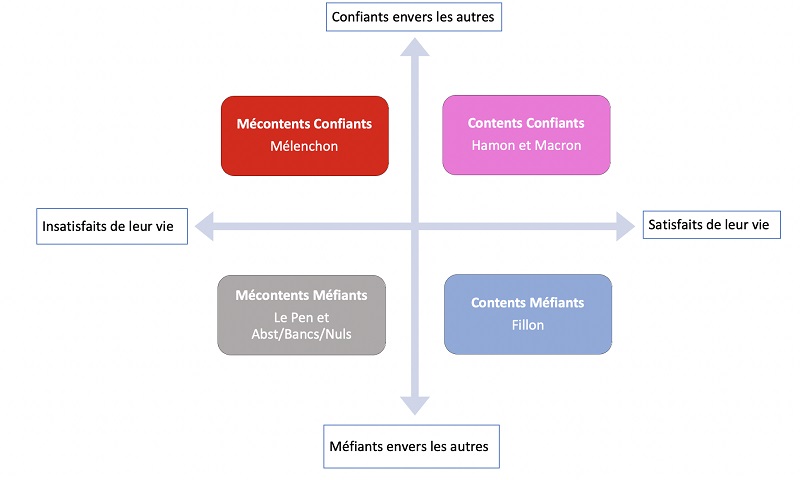
Le croisement des deux axes aboutit à placer les électeurs sur quatre cadrans. Dans les deux cadrans placés à droite, les électeurs d’Emmanuel Macron, mais aussi de Benoît Hamon et de François Fillon ont tous un niveau de bien-être élevé : ils sont plutôt satisfaits de leur vie. Ce qui les différencie est le degré de confiance qu’ils projettent dans le corps social : macronistes et hamonistes sont confiants, tandis que les fillonistes sont défiants.
À l’inverse, les électorats de Jean-Luc Mélenchon et de Marine Le Pen convergent sur le point de leur insatisfaction : les deux électorats de la gauche radicale et de la droite populiste se recrutent parmi les perdants économiques déclarant un faible niveau de bien-être.
Le clivage gauche/droite réapparaît avec la prise en compte de l’axe de la confiance.Mais, et c’est le point crucial, loin de s’évanouir, le clivage gauche/droite réapparaît avec la prise en compte de l’axe de la confiance. Comme on le pressent, les électeurs de la gauche radicale font plutôt confiance en leurs prochains quand ceux de Marine Le Pen ont plutôt l’impression de vivre dans une société de défiance. Selon les chercheurs, alors que « la société postindustrielle promettait l’émancipation des hiérarchies anciennes, elle a surtout creusé la solitude sociale et le sentiment d’insécurité. Et, loin de préparer une société d’autonomie et de liberté, elle a renforcé le besoin de protection. »Or, c’est parmi « le monde postindustriel des services », celui des ouvriers et employés des petites entreprises artisanales, peu syndiqués, précarisés et évoluant dans des configurations qui favorisent peu le collectif, « que s’expriment le plus fortement les sentiments de solitude et de mal-être social ». Cette défiance s’exprime évidemment à propos de l’immigration chez ces électeurs, mais elle est plus globale et elle concerne également, dans une moindre mesure, voisins, amis et même entourage familial.
La combinaison mal-être et défiance est donc le propre des électeurs des partis de droite populiste, qui sont, selon les auteurs des Origines du populisme, non seulement « les perdants de la nouvelle économie, mais encore les perdants de la ’société des individus’ ».
À l’inverse, la confiance interpersonnelle est la marque d’une culture politique très ancrée à gauche, notamment au sein de l’électorat de la fonction publique. La confiance est devenue, dans une société dans laquelle l’appartenance de classe recule, « le filtre qui permet aux individus de se donner un projet de société désirable », ce qui explique que « malgré une détestation partagée des élites, les deux versants de la protestation antisystème prennent appui sur des valeurs fondamentalement opposées. »
Dans le monde d’après l’effondrement de la civilisation, on ne pourra compter que sur soi-mêmeForts de ce détour théorique, nous pouvons revenir à notre fin du monde et constater que, lorsqu’est posée une question très similaire à celle des enquêtes sur la confiance interpersonnelle dans un cadre collapsologique, les préférences partisanes et politiques révèlent tout leur poids. À une formulation aussi frontale que « dans le monde d’après l’effondrement de la civilisation, on ne pourra compter que sur soi-même », l’adhésion augmente de façon linéaire en partant des électeurs de Benoît Hamon (40 % le pensent) à ceux de Marine Le Pen (72 % le croient) en passant par ceux de Jean-Luc Mélenchon (45 %), de François Fillon (48 %) et d’Emmanuel Macron (49 %), tous trois à des niveaux assez proches. La moyenne française (obtenue sur la base des seuls répondants qui adhèrent à la thèse de l’effondrement imminent ou lointain, qu’il soit brutal et monocausal ou progressif) s’établit sur cet item à 52 %.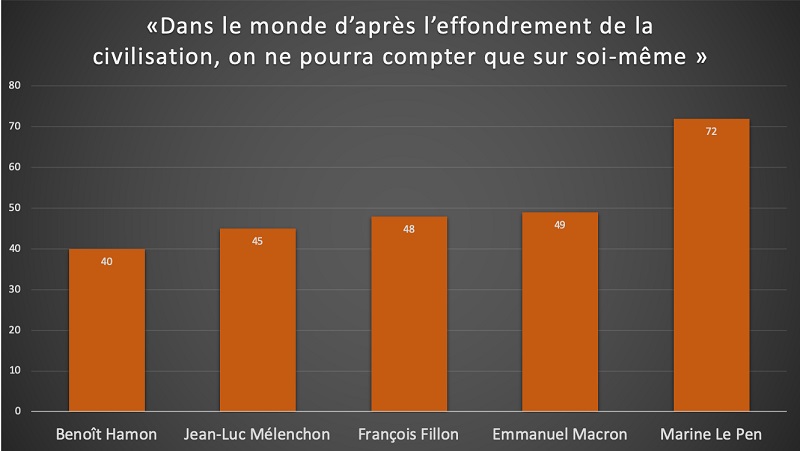
Part des électeurs de ces candidats au premier tour qui adhèrent à la proposition : « Dans le monde d’après l’effondrement de la civilisation, on ne pourra compter que sur soi-même »
Base : 65 % des Français pour lesquels « la civilisation telle que nous la connaissons actuellement va s’effondrer dans les années à venir »
Entraide et solidarité contre ressentiment et menaces de l’autre
Ces résultats incitent à associer les deux grands récits de l’effondrement que sont la collapsologie et le survivalisme à des tendances politiques bien identifiées. Du côté des premiers et de leur chef de file Pablo Servigne, l’accent est mis sur l’entraide et la solidarité.
Les publications ou les groupes Facebook proches de la collapsologie sont grandement consacrés aux aspects socioculturels du monde d’après l’effondrement et, lorsqu’il s’agit de savoirs pratiques, ils sont orientés vers l’écologie, mettant en avant les techniques de la permaculture, de l’habitat autonome, participatif et alternatif en « éco-village », « éco-hameau » ou autre « éco-lieu », dont les promoteurs « recrutent » souvent de nouveaux habitants par le biais de ces forums.
Sans être absente des pages et forums fréquentés par les survivalistes, la dimension socioculturelle est parfois mise au second plan au profit d’approches plus techniques de la survie, qu’il s’agisse de la gestion d’une base autonome à défendre (la BAD) ou de la liste des équipements du sac de survie (Bug out Bag), liste qui fait l’objet de très nombreuses publications et de photographies d’équipements de la part de membres de ces réseaux. Les survivalistes sont également écolos à leur manière, se rapprochant d’une branche primitiviste : ils sont par exemple des adeptes du « bushcraft », ou « art de vivre dans les bois », une discipline qui s’inspire des façons de vivre, d’interagir avec la nature de civilisations traditionnelles.
Les survivalistes abordent leur préparation à l’effondrement à partir de trois piliers que sont « le jardin, l’autonomie et l’autodéfense », comme le formule le sociologue Bertrand Vidal, spécialiste de ces mouvements. Sur le plan des valeurs et de la vision politique, toujours selon le sociologue, le survivalisme est le signe pour ses adeptes d’une « sortie de la société de la confiance bâtie sur le mythe du progrès créé au XVIe siècle, qui disait que demain sera meilleur qu’aujourd’hui […] ».
Collapsonautes et survivalistes divergent non seulement par certaines approches de la survie, mais avant tout par leurs finalités : « À l’inverse de ces mouvements écologistes, explique encore Bertrand Vidal, les néosurvivalistes ne sont pas mus par le même imaginaire. Quand un écologiste quitte la ville pour cultiver son jardin, il le fait pour rendre le monde meilleur. Pour les survivalistes, ce n’est pas pour rendre le monde meilleur, c’est parce qu’il y a une catastrophe qui plane et c’est donc le seul moyen pour s’en sortir. »
Alors que les influenceurs de la galaxie collapso sont généralement issus des rangs de la mouvance écologiste, le panthéon survivaliste est plutôt composé de personnalités qui mettent en scène leurs capacités de résistance physique et leur aptitude à la survie, à l’image de l’Américain Vol West. Pour toutes ces raisons, il n’y a donc rien d’étonnant à ce qu’apparaisse une congruence entre imaginaires survivalistes et ressentiment nourri par la certitude que les autres sont des menaces plutôt que des ressources.
Les scénarios d’après l’effondrement testés, inspirés directement de ces sous-cultures effondristes – mais sans jamais utiliser les termes « collapsologie » ni « survivalisme » – montrent ici encore un partage assez clair des imaginaires. Une « société stressante et dangereuse dans laquelle l’essentiel de l’activité humaine sera consacrée à la survie » est le scénario le plus probable pour les électeurs des partis de droite et d’extrême droite, avec un score maximal chez les électeurs de Marine Le Pen, alors que le scénario d’une « société sobre basée sur un retour à l’agriculture traditionnelle, une consommation se limitant aux besoins essentiels » a la faveur des électeurs de Jean-Luc Mélenchon – cela ne signifiant pas nécessairement d’ailleurs qu’ils la souhaitent, simplement qu’ils la jugent plus probable.
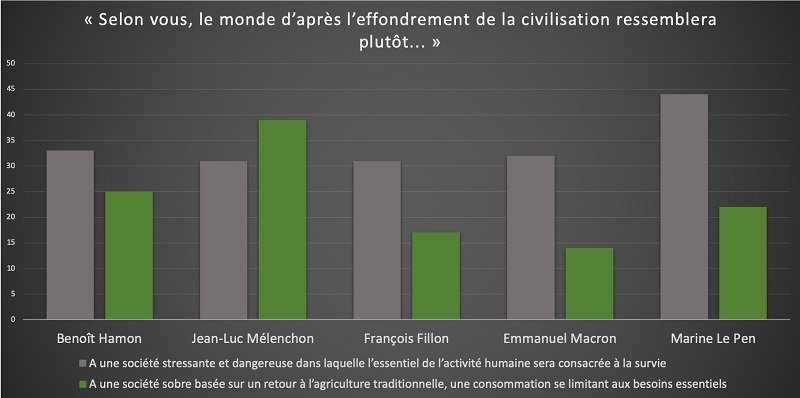
La combinaison du niveau d’adhésion à la thèse de l’effondrement en fonction de la proximité partisane, étudiée plus haut, et des résultats de l’étude concernant les scénarios post-effondrement aboutit à cette représentation schématique du rapport à l’effondrement : d’une part, un tronc commun d’électeurs convaincus par la thèse de l’effondrement, et qui se subdivisent ensuite sur l’axe de la confiance et du modèle de société à reconstruire, ce qui correspond assez bien à l’opposition classique entre imaginaires collapsonautes et survivalistes ; d’autre part, une partie de la population moins directement concernée par la baisse de son niveau de vie, et donc de son niveau de bien-être, moins susceptible de croire à un effondrement prochain.
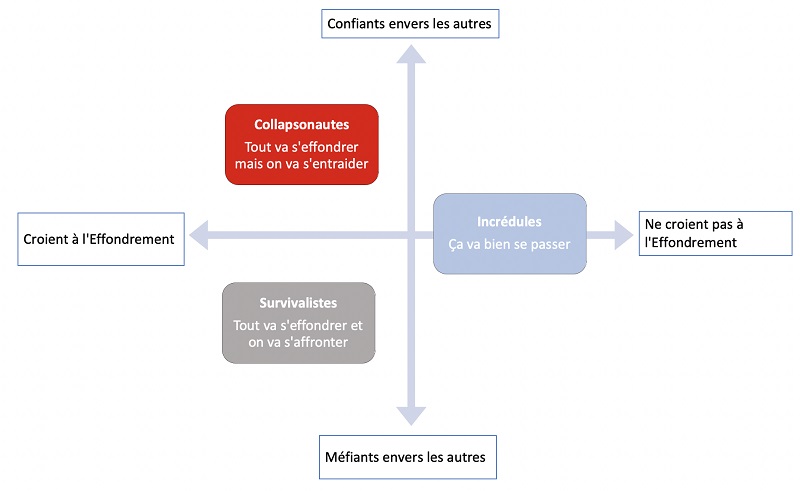
Ce partage schématique entre des imaginaires n’implique en rien que les survivalistes votent Marine Le Pen et les collapsonautes pour un candidat écologiste, mais signifie plus exactement que certains groupes d’adhérents à la thèse de l’effondrement et certains segments de l’électorat peuvent partager une vision du monde commune. Gardons enfin à l’esprit que cette opposition entre collapsonautes et survivalistes est à nuancer et que, dans les faits, des croisements existent entre les deux univers (1).
*********
Pablo Servigne expliquait dans une interview à France Inter en avril dernier, « En collapsologie, il y a deux écueils à éviter : le premier, c’est de dire que « tout est foutu ». Le deuxième, dire que « tout ira bien ». On a besoin d’optimistes et de pessimistes actifs, qui se préparent aux multiples chocs à venir, et pas d’optimistes et de pessimistes passifs, dans le déni.«
En effet, malgré un nombre croissant de citadins français qui cherchent aujourd’hui à s’installer à la campagne et de l’augmentation importante de demandes pour apprendre à devenir collapsologue, en s’équipant d’éolienne sur le toit, de récupérateur d’eau, de four solaire, … l’économiste Loïc Steffan, auteur de N’ayez pas peur du Collapse ! (2), déclarait à France Info que « Beaucoup de gens étaient dans le déni. Le déni est une première phase classique dans un processus que les collapsologues appellent « metanoia », ou « croire enfin en ce que l’on savait déjà ». Avec le Covid, la prise de conscience que nos sociétés sont brutalement fragiles se fait sentir. Un minuscule virus est capable de mettre le monde à genoux, l’hyper-connectivité du monde pose un problème… les stratégies de protection mentale commencent à s’effriter ».
« Le Covid-19 n’annonce pas l’effondrement total de l’État et de l’État de droit mais plutôt une « répétition générale, une sorte de test de stress qui nous a permis de voir ce qui a fonctionné ou non », a-t-il également déclaré. Pour lui, « Contrairement aux survivants, qui veulent courir vers les collines, les collapsologues croient en l’entraide pour améliorer la résilience des groupes. C’est le même point de départ mais pas la même réponse. Le collapsologue veut sauver la société. Le survivant est un individualiste ».
Le coronavirus, donc, est-il le début d’un effondrement imminent ? Tout le monde n’accepte pas cette idée. Pour Laurent Joffrin, rédacteur en chef de Libération, « La crise des coronavirus, aussi tragique soit-elle, a peut-être mis en lumière non pas la fragilité des sociétés modernes, mais leur capacité de résistance« . Selon lui, « Bien qu’ils soient fortement sollicités, les systèmes de santé et les économies n’ont pas implosé et la crise pourrait accélérer la nécessité de mettre en place une transition écologique plus rapide ».
(1) Certaines personnalités évoluent entre les deux pôles, à l’image de l’instructeur en stages de survie et auteur David Manise, interviewé dans la revue de Pablo Servigne et qui s’éloigne des clichés d’un survivalisme paramilitaire.
(2) N’ayez pas peur du Collapse ! de Loïc Steffan et Pierre-Eric Sutter – Edition Desclée de Brouwer, 3 juin 2020


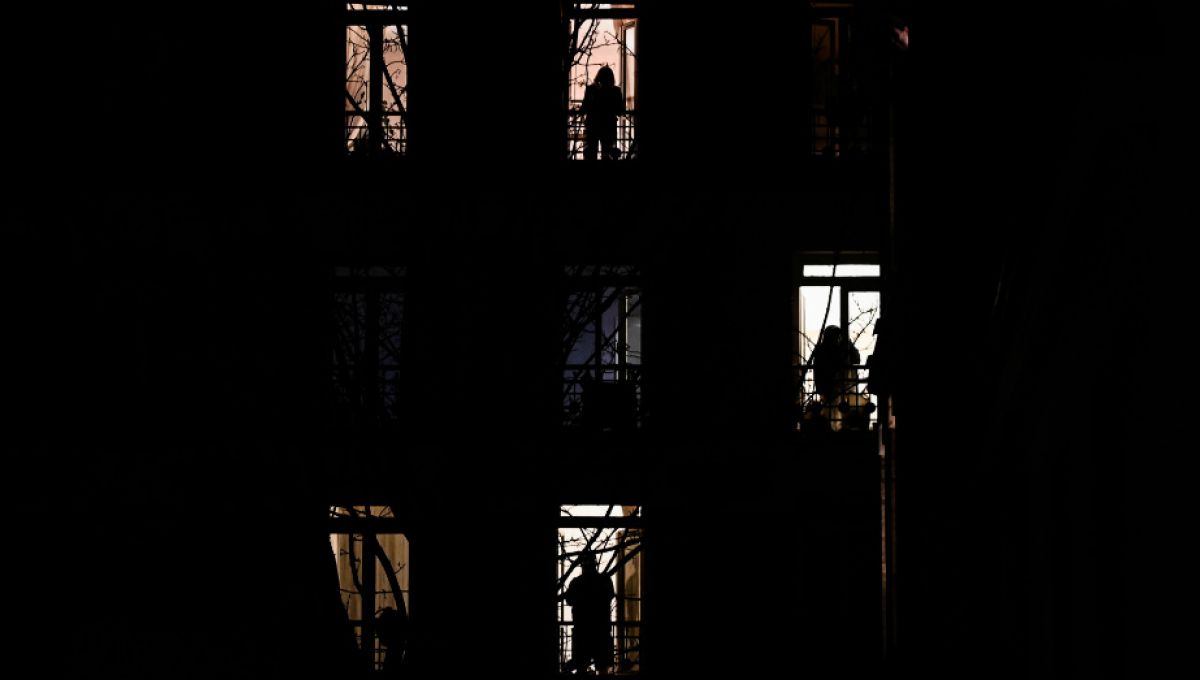

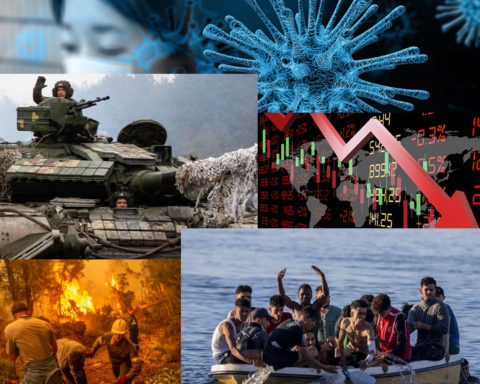


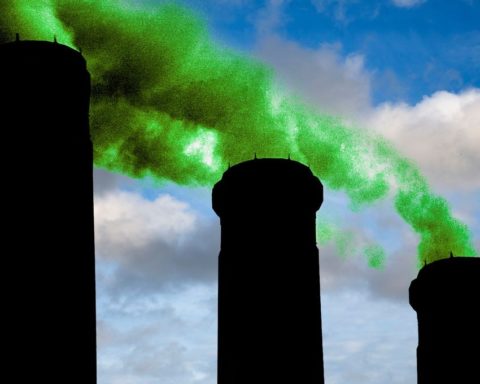





La collapsologie prospère sur l’individualisme et la perte des valeurs sociales, sur des médias qui grossissent systématiquement tous les problèmes et des réseaux qui favorisent le communautarisme sectaire et irrationnel. La réalité, c’est que personne ne veut un « monde d’après » qui impose de réduire confort et consommation, et que les écolos restent une minorité d’aimables bobos sans aucune solution réaliste pour gérer une quelconque « transition ». Les catastrophes naturelles et la fin des civilisations ne sont pas nouvelles, mais l’occident avait fini par les oublier après un demi-siècle de paix et de croissance ininterrompue. Pas de quoi en faire la fin… Lire la suite »
Pas de quoi en faire la fin du monde… pour ceux qui ont un esprit centré sur leurs besoins…. mais pour ceux qui sont connectés à l’environnement tout comme les croyants connectés à leur dieu, la réalité est toute autre, le niveau de dégradation de notre environnement et l’épuisement extrême de nos ressources latentes et encore plus a venir prefigure un effondrement systémique qui se fera probablement progressivement au début…. puis aura une phase d’accélération… pour terminer dans un effondrement violent, qu’on sera nombreux à voir de notre vivant.
L’épuisement des ressources naturelle contredit ce que vous dites la croissance infini dans un monde finis ça n’existe pas la croissance a ces limites amazon appris les parts de marché de des grandes surface mais la croissance n’augmente plus depuis des années il y’a juste une captation des richesses entre les mains d’un minorité!la réduction de la consommation vous n’aurez pas le choix vous croyez que l’homme et au dessus des lois et des cycles naturelles!A part quelques tribus l’homme ne sait pas vivre avec la nature.Vous avez une vision superficielle des choses et du monde pour résumer l’humain a… Lire la suite »
De tous temps l’humain « contemporain » a pensé que son époque serait la « dernière », qu’elle marquerait l’histoire de l’humanité .. Pure prétention !!
Oui, tout comme les anciens disaient que tout part en couille et que c’était mieux avant….sauf qu’on parle ici de l’épuisement extrème de notre environnement, au point d’en arriver à racler meme le fond des oceans pour trouver encore des ressources….mais pour combien de temps encore ? les zones d’ocean où il n’y a plus d’oxygène se développent à vitesse effrayante, tout comme la pollution de l’air, de l’eau et du sol…et la biodiversité s’effondre, et avec ça, vous prenez le vivant de haut comme un roi dirait de son peuple qu’il n’a qu’a manger de la brioche s’il n’y… Lire la suite »
Ni collapsologie Ni survivalisme , simplement un constat à faire à l’endroit ou nous avons les pieds posés:comment organiser une autre façon de vivre ensemble qui respecterait notre planète nourricière en préservant son environnement et tous ces habitants , même si devant notre conduite jusqu’à ce jour nous savons que peu de temps nous reste » avant que le dernier qui s’en ira éteigne la lumière » P .JORION
Bernard Bruyat
Chercheur indépendant Sécessionniste
L’effondrement des Civilisations vient en grande partie de la perte des valeurs qui les fondent, et de l’absence de croyance dans une vision commune, ainsi que la naissance de divisions et de combats pour des revendications partisanes et communautaires. Les sociétés vieillissantes ne sont plus dans l’expansion économique ou sociale, mais dans la préservation des acquis de chaque frange de la société, indépendamment des autres. Les régles tatillonnes et partisanes qui ont été érigées, bloquent toute évolution jusqu’à l’absurde au dépends des autres citoyens. Chacun exige des droits sans soucis de la communauté. C’est la règle du « chacun pour soi »… Lire la suite »
Merci pour votre analyse et votre partage.
Je ne suis pas convaincu de tous les prémices, mais l’analyse sur le long terme comparé à la civilisation romaine s’impose à moi aussi.
NI collaptionisme Ni survivalisme
Je crois qu’il faudra encore beaucoup de LILITHS pour accompagner sur un autre chemin les ADAMS qui pensent encore que l’on peut garder le pouvoir même avec une Côte en moins.
Je crois que ces LILITHS ont compris que la Jeunesse n’est pas encore née.
Auront elles envie de la concevoir avec des ADAMS qui ne laissent aucune place à des TERRESTRES RESPONSABLES pour faire simplement un pas de côté .
Bernard Bruyat
Chercheur indépendant Sécessionniste
OPDLM université du pas de côté
Il serait peut être intéressant de spécifier que cet article est une republication…
Nous en sommes au stade des hypothèses concernant un possible effondrement et ses conséquences. Qui peut prédire des certitudes telles qu’elles sont formulées dans cet article ? Une seule chose me paraît certaine, l’épuisement des ressources énergétiques fossiles d’ici quelques dizaines d’années… Ensuite ? Tout le monde en milieu rural en étalant la ville de façon horizontale ? Hypothèse quelque peu farfelue alors que 70 % de la population mondiale vit en milieu urbain très concentré ? Les surfaces habitables et cultivables sont-elles suffisantes pour faire vivre è à 8 milliards de personnes (horizon 2050) ? Ce qui manque à… Lire la suite »